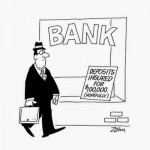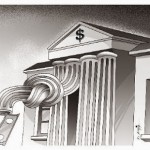 International Man article on how western world indebted governments need money, how they will protect the big banks at the expense of the citizens withfinancial repression .. The International Monetary Fund (IMF) published a horrifying paper, called The Fund’s Lending Framework and Sovereign Debt. That paper in turn was based on one from December 2013, called Financial and Sovereign Debt Crises: Some Lessons Learned and Those Forgotten .. The December 2013 document, right at the start, says that financial repression is necessary: “The claim is that advanced countries do not need to resort to the standard toolkit of emerging markets, including debt restructurings and conversions, higher inflation, capital controls and other forms of financial repression .. As we document, this claim is at odds with the historical track record of most advanced economies, where debt restructuring or conversions, financial repression, and a tolerance for higher inflation, or a combination of these were an integral part of the resolution of significant past debt overhangs.” .. The IMF report goes on to say: “Governments can stuff debt into local pension funds and insurance companies, forcing them through regulation to accept far lower rates of return than they might otherwise demand .. Domestic defaults, restructurings, or conversions are particularly difficult to document and can sometimes be disguised as ‘voluntary’ .. The Fund would be able to provide exceptional access on the basis of a debt operation that involves an extension of maturities .. That means that 30-day notes can be instantly turned into 30-year bonds.” – this last sentence means the ability to change 30-day notes into 30-year bonds, effectively holding the money captive for a much longer period of time .. here are some more examples globally:
International Man article on how western world indebted governments need money, how they will protect the big banks at the expense of the citizens withfinancial repression .. The International Monetary Fund (IMF) published a horrifying paper, called The Fund’s Lending Framework and Sovereign Debt. That paper in turn was based on one from December 2013, called Financial and Sovereign Debt Crises: Some Lessons Learned and Those Forgotten .. The December 2013 document, right at the start, says that financial repression is necessary: “The claim is that advanced countries do not need to resort to the standard toolkit of emerging markets, including debt restructurings and conversions, higher inflation, capital controls and other forms of financial repression .. As we document, this claim is at odds with the historical track record of most advanced economies, where debt restructuring or conversions, financial repression, and a tolerance for higher inflation, or a combination of these were an integral part of the resolution of significant past debt overhangs.” .. The IMF report goes on to say: “Governments can stuff debt into local pension funds and insurance companies, forcing them through regulation to accept far lower rates of return than they might otherwise demand .. Domestic defaults, restructurings, or conversions are particularly difficult to document and can sometimes be disguised as ‘voluntary’ .. The Fund would be able to provide exceptional access on the basis of a debt operation that involves an extension of maturities .. That means that 30-day notes can be instantly turned into 30-year bonds.” – this last sentence means the ability to change 30-day notes into 30-year bonds, effectively holding the money captive for a much longer period of time .. here are some more examples globally:
* In 2009, the government of Ireland swiped €4 billion from its National Pensions Reserve Fund in order to prop up its insolvent banks. The following March, they stole the remaining €2.5 billion for another bailout.
* In November 2010, the French parliament took €36 billion from a reserve pension fund to pay the debts of a “social” fund.
* Also in November 2010, the government of Hungary effectively took 2.7 trillion forints ($13.5 billion) from 3 million retirement accounts.
* The government of Poland nationalized one-third of future contributions to individual retirement accounts. That money will almost certainly disappear into the state treasury, robbing savers of some $2.3 billion per year.
LINK HERE to the article
Disclaimer: The views or opinions expressed in this blog post may or may not be representative of the views or opinions of the Financial Repression Authority.





 09/23/2014 - Another Unintended Consequence Of Financial Repression: Banks Taking Highers Risks On Derivatives
09/23/2014 - Another Unintended Consequence Of Financial Repression: Banks Taking Highers Risks On Derivatives

































